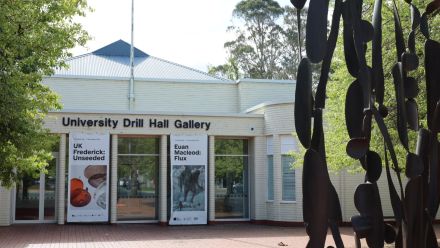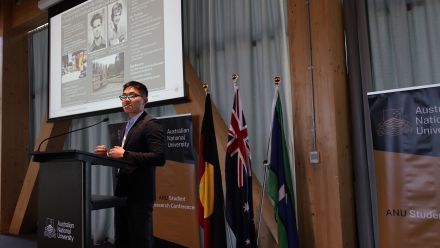Susan Bambrick OBE
It didn’t seem like it at the time, but Susan Bambrick was a feminist.
“I was then at McMaster University, Canada doing a course in Monetary and Mathematical Economics. It was the tail end of the Woodstock-era and during the midst of the Cultural Revolution in China.
‚ÄúI was married shortly after arriving at the ANU ‚Äď and that was interesting in the context of Canberra at the time,‚ÄĚ she says.
‚ÄúMy soon-to-be husband was a public servant, but we didn‚Äôt qualify for public service housing because we weren‚Äôt married when we came. If I had been a married bloke I would‚Äôve qualified for University accommodation, but I was a married female. It meant that we entered the housing market, because we had no other option.‚ÄĚ
“Now that was a hardship. I knew it was sexist. Just going to get a housing loan was sexist too, because the bank wouldn’t take any account of my income. Women were dangerous, they went off and got pregnant, you see, so you could not account for their incomes."
‚ÄúI knew it was sexism, though we didn‚Äôt have the word, and the word discrimination hadn‚Äôt been publicly applied in that context either.‚ÄĚ
Even though Bambrick says that if it happened today she‚Äôd likely go out and campaign, it just wasn‚Äôt ‚Äėthe done thing‚Äô at the time.
‚ÄúAnd there weren‚Äôt too many of us to get together and campaign, because really, I was among the first married female PhD students at ANU.‚ÄĚ
‚ÄúMy friends and I were different from the generation before though, we were not planning on retiring when we had children: so we knew we were trailblazers.‚ÄĚ
‚ÄúWhen I joined the department as a research assistant, one particular Professor didn‚Äôt speak to me, and when I became a PhD Student he didn‚Äôt speak to me. And in fact, he didn‚Äôt speak to me until years later when I became the Academic Assistant to the Vice Chancellor. Then he spoke to me.‚ÄĚ
Over her time at ANU as a PhD scholar, Bambrick faced various challenges, a particular blow coming with her first pregnancy when her scholarship was suspended, instead she received a grant in aid. Furthermore, academic work could be subtly degraded through attitudes and comments.
Bambrick’s husband along with various male faculty and administration members eventually showed the nous required to support the promising academic, and helped her to achieve great things.
‚ÄúI had a wonderful Head of Department, Burge Cameron, who was well aware of my family situation and assumed I was managing it.‚ÄĚ
Her PhD examiners were the Giblin Professor of Economics from Melbourne, the Commonwealth Statistician and the Secretary of the US Department of Commerce. She submitted in July and graduated with her PhD in September.
She had proved her academic worth, and went on to be a leader in the University, become a Dean of Students and also Master of University House.
But she initially did not identify as a feminist.
‚ÄúWhen Germaine Greer started running around and burning bras and things, I would have to say ‚Äėno‚Äô I didn‚Äôt call myself a feminist, because I couldn‚Äôt relate to that. All the men-hating stuff didn‚Äôt accord with my life.‚ÄĚ
‚ÄúMy father had facilitated my going to University, and I had a very nice husband, so the whole idea that the entire world of men was horrible I just couldn‚Äôt accept.‚ÄĚ
‚ÄúI have to say, though, as the world has gone on, and I‚Äôve looked back, I‚Äôd have to say that yes, I was a raving feminist." ‚ÄúAnd I still am.‚ÄĚ
Photo:
Further reading:


